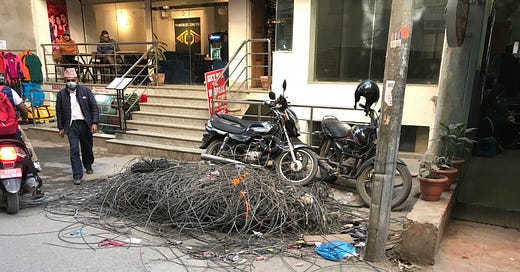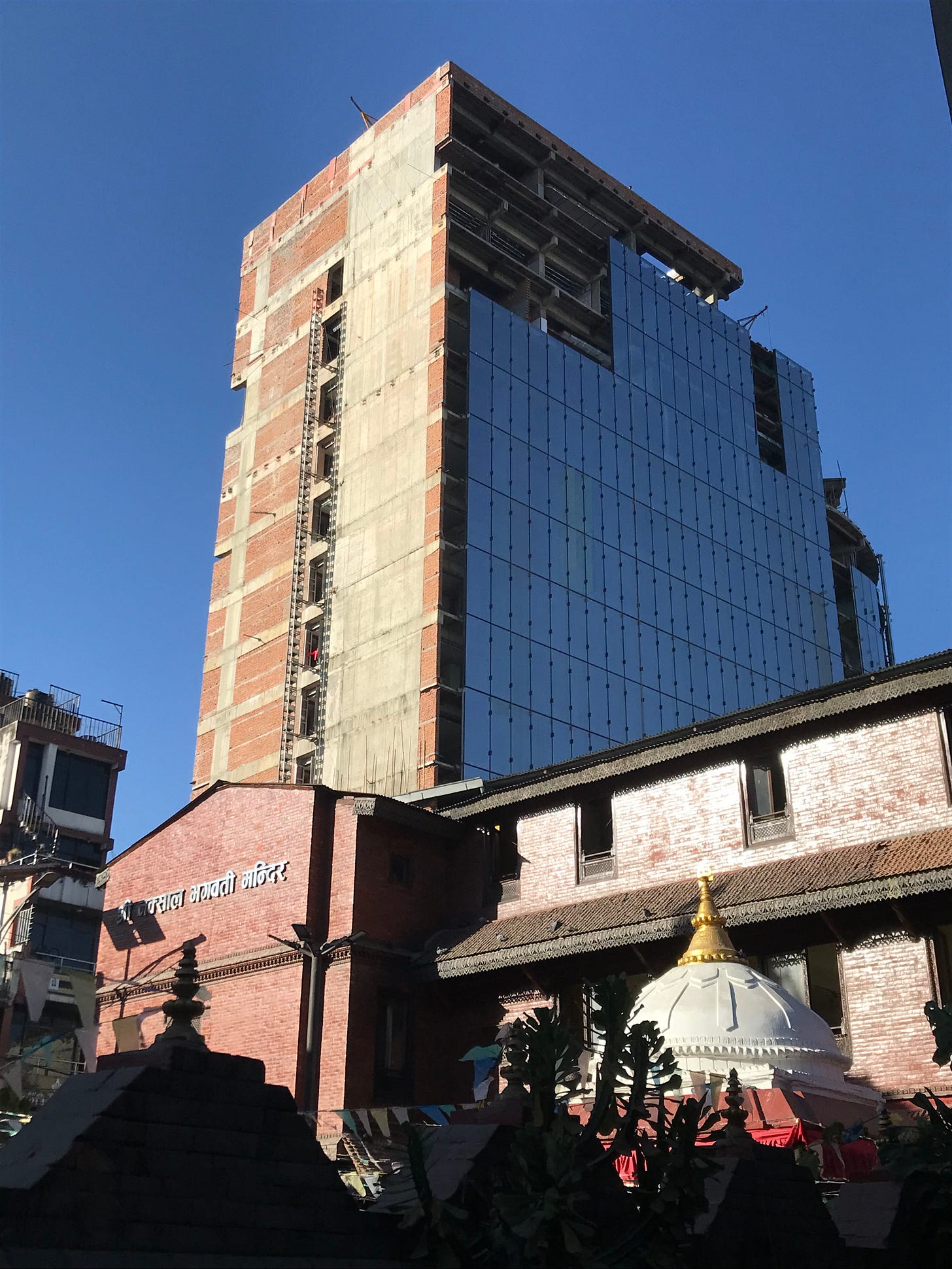Monday was one of those days when my brain couldn’t seem to click into gear no matter how much I tried, so instead of continuing to fight it I went for a long walk. Thought I’d run a few errands. Tire myself out.
I entered Thamel though a road taken over by a work crew tearing down old electric wires, a process that has been going on in some form or another in different parts of town for quite some time now. I had a phone call with a friend as I meandered, tried to fix some earrings, ate something for lunch that wasn’t bad yet not as good as I’d hoped.
Then I headed for the post office. There are a number of small post offices that I’ve run across here and there around the valley—the tiny one at Patan Dhoka springs to mind—but the main GPO was, for years, a stone’s throw from the Dharahara Tower, in Sundhara.
A few years ago—I really wish I could remember when, and this is a question Google does not seem to have the answer to—I went past it only to see it on the receiving end of a bulldozer’s attention.
In Dillibazaar, I found the new location, a nondescript building covered in lots of reflective windows that managed to look old despite having clearly been newly built.
Thing is, I’d never thought much of the old building, which seem to me of brutalist design, and just rather drab. Only after I saw the shiny new thing that replaced it did I realize that while the old one may have been ugly, it had character.
Collectively, I’ve spend a lot of time in that old building over the years. Nothing there lent itself to speed. Lines to buy stamps, and after you stuck them on your postcards, a line to have them cancelled, by hand. The old franking machine watched by an awe-struck man—turned out he was a visiting airline pilot with a penchant for old post office equipment. He explained how rare the hand-crank machine was, to see it in working order was a wonder! Apparently on his layovers he liked to check out different countries’ post offices. (I know, that people like that exist was news to me, too! [And did I see the irony of writing this comment in the middle of a post about post offices? Only in edits, dear reader.] ) Remembering that interaction always brings me that small pang of guilt of something quickly promised and never followed through on. Somewhere I have—or had—his card, given with a request to send him something, anything, that had been cancelled with that franking machine. I agreed but never did, and have always felt a little bad, the franking machine didn’t last forever and in the latter years of the old building, it wasn’t often there. Only as I’m writing this did it occur to me, Why didn’t he send himself something then and there? And Why am I only thinking of this now?
That old building also reminds me of a dear friend with whom I used to poke through the baskets of poste restante, searching for our names, entertaining a romantic notion that someone who didn’t know how to contact us might try to reach us there.
But probably the longest stretches of time spent there were whenever I had to pick up a large package; technically the rules stated this to be anything over two kilos, but it seemed to go more by the size than the weight.
After receiving a phone call, a slip in your post box, or both, or neither (in this latter case, when expecting something, it was prudent to check the file filled with slips), one ventured into the back rooms.
Once you knew the ropes, you’d ask the men who navigated the backroom maze to locate your parcel while you began the paperwork, to save time. Sometimes you’d have to go help find it, but not often.
A vibrant pink form to fill out, two sheets, carbon paper between them. About 25 places to slot information, but you soon learned only 5 or so were needed, and those at the counter were happy to point you to which ones those were. Did I mention the form is in Nepali? And mostly not the sort of terminology I know how to read.
Then you take your form to the official who checks your parcel. Sometimes they are hard to find; if you’ve timed it wrong they may be on lunch, or a tea break. The line for their attention might be six people deep. This is also a reason to have located your parcel first: they often don’t have patience if locating it takes a while, and summoning them twice—well, that’s just annoying. And you don’t want to annoy them.
Once they’re finally free you open your envelope, box, or parcel together, and they assess a tax value to it. The system for this is sporadic at best. Electronics are high, of course, and books are usually free but not always. Cat flea and tick collars were a confusing category; a fellow passenger on the long voyage that day explained to the person in charge that they were medicine, which helped. There was a large book that I occasionally saw consulted when consensus could not be reached.
After the decision is made and the value and tax scribbled in its slot and duly signed, you then move to the office of the real in-charge guy, who reads what his employee wrote and signs it. This is usually formality, but sometimes it isn’t. Eventually, another signature joins its fellow.
Then, back to the room where the parcel-checkers hang out, where your package details are entered in a very large ledger; if you have to pay tax this is also noted here, and this is where you pay it and get a receipt. Sign the book, get two copies of the receipt, one of which is for the pink-paper counter people. There the sewing pin that holds your two pink pieces of paper together is removed and put with its fellows to be reused, as is the carbon paper between them. You pay ten or twenty rupees for the form at this point, both copies of which are stamped: one you keep, the other joins an evergrowing pile which will go into a file of records somewhere, and, triumphantly, go back to claim your package, which has been waiting for you at the open-and-check counter, having usually been roughly taped back up. If your package has been sitting in storage for longer than it should, there’s a small charge levied per day, but it’s not much.
It was annoying at first, and then, once I got the hang of it, it wasn’t; I gained a sort of perverse appreciation for the many, many layers involved. I learned never to go to the post office when I was in a hurry, always bring a book. Helpfully point people as lost as I was in the right direction, as others had done for me.
It’s been a while now since I’ve gotten an oversize parcel, not since the move to the new post office for sure, and that’s at least three or four years, I think, so I don’t know if the process has changed or not. The rooms are different now, a lot of the familiar faces seem gone, too, so if and when I do I’ll have to learn the process again from scratch.
**
Back to Monday: I picked up some parcels—books and art supplies, all below the size limit so quickly retrieved, then on to the wholesaler for raisins to make fruitcake, and finally abandoning the dream of rotisserie chicken to take a shorter loop home, after a day when my walking app logged sixteen and a half kilometres, because my legs were tired even though my mind still wasn’t.




